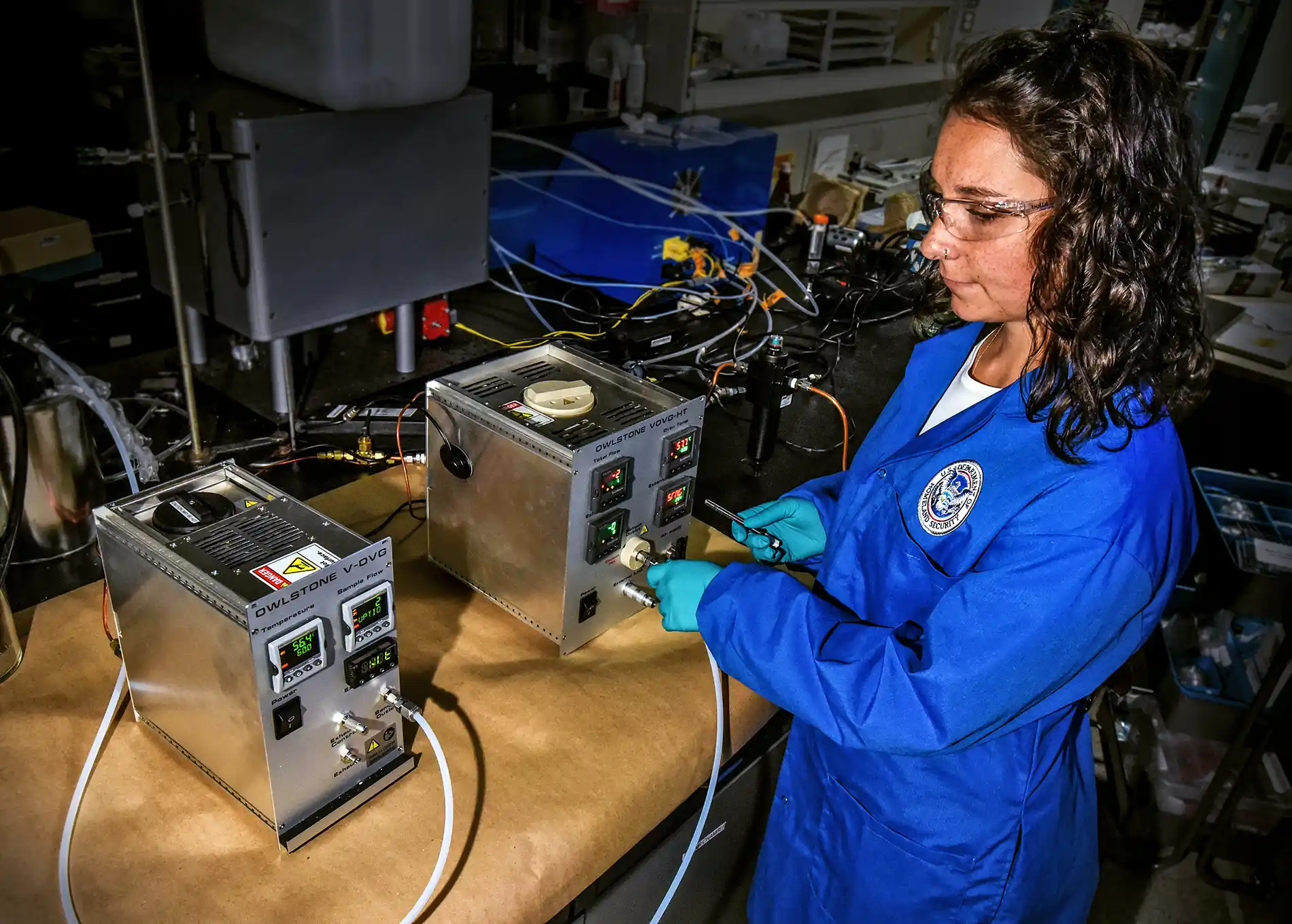ORISE Fellow Uses Chemistry to Differentiate Potentially Dangerous Field Material
Meet Cara Kientz

Cara Kientz tests samples in the TSL laboratory. Photo Credit: TSL ORISE
Cara Kientz has been interested in STEM fields from an early age. Her dad was a robotics engineer, and Kientz remembers going to his workplace and previewing his various projects. Kientz chose to focus on chemistry with the help of a high school teacher, Ms. Dare, who made learning fun and encouraged Kientz to continue her studies in college. Kientz followed these examples and received a Bachelor of Science from Stockton University in 2021.
While at Stockton, Kientz participated in a cooperative research and development agreement with the Transportation Security Laboratory. After graduating, she was encouraged to apply for the TSL Post Baccalaureate Fellowship. “This was an easy choice for me because I was already familiar with the type of work being done at the TSL, and I was excited to continue supporting them and expand my knowledge in that field,” Kientz says.
The TSL program is designed to provide opportunities for research, development, and education on DHS mission-relevant science for academics on multiple levels, ranging from undergraduate and graduate students to postdoctoral fellows and visiting faculty members. The program seeks to enhance the quantity, quality, and diversity of the future DHS scientific and engineering workforce.
During her time at the TSL, Kientz worked with mentor Dr. Johnny Perez and the trace team within the applied research division chemistry branch. Her research was focused on finding new detection methods for trace amounts of explosives. Her first project involved developing a method to detect energetic salts using chromatography and mass spectrometry. Since these ionic materials are so common in our everyday environments, Kientz was tasked with finding a method that could differentiate potentially dangerous energetic salts from environmental salts. Kientz also worked on developing a liquid chromatography method that separates several nitramine and nitrosamine explosives.
These projects are of the utmost importance for TSL. “We want to make sure that the instruments going out into the field work accurately and properly, which means we can live in a safe environment,” Kientz explains.
Kientz’s appointment granted her the freedom and independence to learn the entire research process, from gathering and analyzing data through drafting a manuscript for publication. “Usually, my days consisted of developing a test plan or experiment, running it, and then analyzing it,” she says. “I was able to discuss the findings with my mentor, which gave me ideas on how to proceed in the next steps.”
Kientz speaks highly of the experience she gained during her time at TSL. “I learned so much about method development and troubleshooting, which you don’t learn much about in undergraduate studies,” she says. “These skills are vital in my future career as a chemist, especially in the laboratory.”
Kientz also emphasizes the range of opportunities available through her program. “I think something that surprised me was the diversity in careers the TSL had,” she relays. “I was able to work with not only other experienced chemists, but engineers, physicists, etc.” She presented research at the 2023 International Symposium on the Analysis and Detection of Explosives (ISADE) and found it valuable to attend the Trace Explosive Detection (TED) Workshop in 2022.
“As someone who has never been to a professional event before, I was able to network with some of the most successful scientists around the world,” she says.
After her opportunity, Kientz accepted a position as a research technician at Los Alamos National Laboratory. “Even though I am leaving the TSL, I hope to continue to work in the defense industry as a chemist,” she says. She looks back on this time as fundamental for her development as a scientist. When speaking about her time at TSL, Kientz emphasizes just how much she gained as a scientist. “I had a great learning experience here at the TSL,” she says. “I think my favorite part was the independence and leniency I had. Since the goal was mostly to learn, I was able to really get my hands on what interested me the most.”
The DHS TSL Visiting Scientist Program is funded by DHS HSARPA’s Explosives Division and administered through the U.S. Department of Energy’s (DOE) Oak Ridge Institute for Science and Education (ORISE). ORISE is managed for DOE by ORAU.

